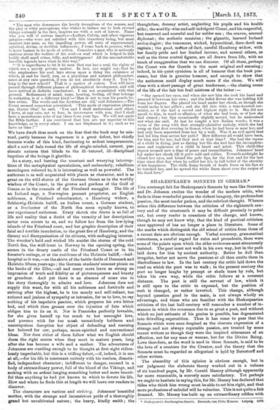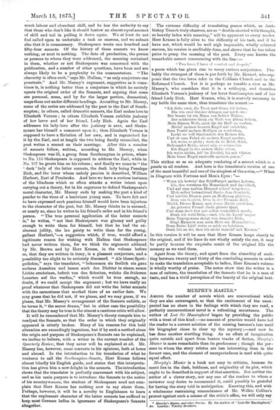ST-I krk ESPEARE'S SONNETS IN GERMAN.* FlIE contempt felt for
Shakespeare's Sonnets by men like Steevens and Dr. Johnson excites the wonder of the modern critic, who finds in these wonderful poems the richest imagery, the profoundest passion, the most tender pathos, and the subtlest thought. Whence arises this difference between the criticism of the eighteenth cen- tury and of the nineteenth it may be difficult precisely to point out, but every reader is conscious of the change, and knows, though he may not know why, that the kind of poetical criticism once approved of has no longer a place in literature. Some of the marks which distinguish the old school of critics from those of a recent date are obvious enough. Verbal accuracy, grammatical correctness, a careful regard for rules and precedents, these were some of the points upon which the elder reviewers most strenuously insisted. The poet must not walk in his own way, but in the path laid down for him by ancient authority. Better be dull than, irregular, better not move the passions at all than excite them in disobedience to law. In the last century the critic laid down the road on which the poet was to walk ; in the present century tha poet no longer laughs by precept or sheds tears by rule, but takes he own way, while the critic follows at a reverent distance. The poet is still the servant of law, which it is still open to the critic to expound, but the position of each is changed, or rather inverted. This change, although beyond question good in the main, is not always wholly an advantage, and those who are familiar with the Shakespearian criticism of the last half-century will remember a number of in- stances in which the reverence due to so great a poet, and without which no just estimate of his genius is possible, has degenerated into drivelling superstition. Thus it has come to pass that the Sonnets which were once despised as the obscure expression of a strange and not always reputable passion, are treated by some recent writers as though they were the inspired utterances of an affection, not for any man or woman, but for the Divine Being.. Love therefore, as the word is used in these Sonnets, is said to be the love of a creature for the Creator, and the theory that the Sonnets must be regarded as allegorical is .1gld by Bernstorff and other writers.
The absurdity of this opinion is obvious enough, but in our judgment the elaborate theory worked out in a volume of six hundred pages, by Mr. Gerald Massey although apparently far more reasonable, is scarcely more satisfactory. Yet perhaps we ought to hesitate in saying this, for Mr. Massey has declared that thiose who think him wrong must be able to set him right, and that mere professions of unbelief will be valueless. This is not quite a fail demand. • Mr. Massey has built up an extraordinary edifice with
* Shakespeare's Southampton-Sonette. Deutsch, von Fritz Krauss. . Leipzig. 1872.
much labour and abundant skill, and he has the audacity to say that those who don't like it should bestow an almost equal amount of skill and toil in pulling it down again. We at least do not feel called upon to undertake a task so onerous, and we submit also that it is unnecessary. Shakespeare wrote one hundred and fifty-four sonnets. Of the history of these sonnets we know nothing, or next to nothing. The date of production, the person or persons to whom they were addressed, the meaning contained in them, whether or not Shakespeare was concerned with the publication, and a number of other questions, have been and are always likely to be a perplexity to the commentators. "The obscurity is often such," says Mr. Hallam, " as only conjecture can penetrate." And Mr. Massey's argument, suggestive as it some- times is, is nothing better than a conjecture in which he entirely upsets the original order of the Sonnets, and arguing that some are personal, some, and by far the larger portion, dramatics], maps them out under different headings. According to Mr. Massey, some of the series are addressed by the poet to the Earl of South- ampton; in others, called dramatic sonnets, the Earl makes love to Elizabeth Vernon ; in others Elizabeth Vernon exhibits jealousy of her lover and of her friend, Lady Rich. Again the Earl addresses his lady-love after the jealousy is over, and Shake- speare has himself a comment upon it ; then Elizabeth Vernon is supposed to have a flirtation of her own, and is reproached for it by the Earl, and at length the two being finally reconciled, the poet writes a sonnet on their marriage. After this a number of sonnets follow, written, according to Mr. Massey, when Shakespeare was ill, a group from Southampton in prison, where in No. 115 Shakespeare is supposed to address the Earl, while in No. 107 he greets him on his release ; and finally we come to " the dark' lady of the latter sonnets, the dark lady being Penelope Rich, and the lover whose unholy passion is described, William Herbert, Earl of Pembroke. And here we have a curious instance of the blindness which so often attacks a writer intent upon carrying out a theory, for in his eagerness to defend Shakespeare's moral character, Mr. Massey ends by making the poet a kind of pander to the vices of a lascivious young man. To have felt and to have expressed such passions himself would have been injurious to the character of the poet, but Mr. Massey thinks he is excused, or nearly so, since he writes to his friend's order and in his friend's person. " The true personal application of the latter sonnets • is," he writes, " not that Shakespeare was gloomy and guilty enough to write them for himself, but that he had the ex- uberant jollity, the lax gaiety to write them for the young, gallant Herbert,"—a suggestion which, if true, would afford a legitimate reason for 'wishing with Hallam that Shakespeare had never written them, for we think the argument adduced by Mr. Brown and by Herr Krauss, in the volume before us, that they are written in irony, is a pleasant conjecture, and a possibility too slight to be seriously discussed. " Als blosse Spott- gedichte," says the translator, " bekotnmen sie freilich ein ganz anderes Aussehen und lessen auch den Dichter in einem neuen Lichte erscheinen, befreit von den Sehatten, welche die friiheren Lesarten auf ihn warfen," which would be true enough, no doubt, if we could accept the argument ; but we have really no proof whatever that Shakespeare did not write the latter sonnets with the earnestness that marked those of an earlier date. We may guess that he did not, if we please, and we may guess, if we please, that Mr. Massey's arrangement of the Sonnets unfolds, as he terms it, " the secret drama," but in either case.the possibility that the theory may be true is the utmost a cautious critic will allow.
It will be remembered that Mr. Massey's theory compels him to readjust the Sonnets, so that the order in which they originally appeared is utterly broken. Many of his reasons for this bold alteration are exceedingly ingenious, but if by such a method alone the origin and purpose of Shakespeare's Sonnets can be explained, we incline to believe, with a writer in the current number of the Quarterly Review, that they never will be explained at all. Mr. Massey has, however, some converts to his opinions, both at home and abroad. In the introduction to his translation of what he ventures to call the Southampton-Sonette, Herr Krauss follows almost blindly his English guide, and states that this interpreta- tion has given him a new delight in the sonnets. The introduction shows that the translator is perfectly conversant with his subject, and as his main purpose is to introduce the Sonnets to the notice of his countrywomen, the student of Shakespeare need not com- plain that Herr Krauss has nothing new to say about them. Perhaps, however, it will be a novelty to Englishmen to learn that the unpleasant character of the latter sonnets has sufficed to keep most German ladies in ignorance of Shakespeare's Sonnets altogether.
The extreme difficulty of translating poems which, as Arch- bishop Trench truly observes, are so " double-shotted with thought, BO heavily laden with meaning," will be apparent to every reader. Herr Krauss is fully alive to the difficulty of his task, and if he have not, which would be well nigh impossible, wholly achieved success, his version is creditably done, and shows that he has taken pains to grasp the meaning of the poet. Every one knows the remarkable sonnet commencing with the line :— " Two loves I have of comfort and despair,"
a poem which has given rise to many curious conjectures. Pro- bably the strangest of these is put forth by Mr. Heraud, who sup- poses that the two loves refer to the Celibate Church and to the Reformed Church. Yet it is perhaps as tenable a view as Mr. Massey's, who considers that it is a soliloquy, and describes Elizabeth Vernon's jealousy of her lover Southampton and of her friend Lady Rich. Herr Krauss, who, it is scarcely necessary to say holds the same view, thus translates the sonnet :—
" Ich Hobo zwei, die Trost and Grain ich hoisse,
Die wio zwei Geister dringon auf mich ein Der bessre ist eM Mann von lichtor Weiss°, Der schlechtre Geist eau Woib von iiblom Schein.
Mein Damon Weib, mich far die How zu werbon,
Miicht' moinen bessern Engel mir entziehn; Zum Teufel meinen Heil'gen zu verderben, Lockt sio voll Siindenstolz don Reinon bin.
Und oh zum Feind sio moinen Engel machte, Ich Weiss es nicht ; doch da sio Beide flohn, Bofreundet Beide, ahnet mir, es sehumehte EM Engel in des andern Holle sehon.
Ich weiss nichts, lob' im Zweifel, his mit Gluten Mein User Engel austroibt meinen guten."
This strikes us as an adequate rendering of a sonnet which is a puzzle to all readers. And here is the translator's version of one of the moat beautiful and one of the simplest of the series,—" When in Disgrace with Fortune and Men's Eyes : "—
" Wenn ich bewoin' den Schiffbruch meines Lebons, Ich, den verstiess die Menschheit und des Gluck,
Und auf zum tanben Himmel sehrei vergebens, Mich selbst betrachtencl finch° dem Geschick, Und mochte Diesetn gern an Hoffnung gleichen, Dem von Gesicht. Dem in der Freunde Zahl.
Mocht, Diesos Kunst, and Jones Macht erreichen, An grosster Freude finde grosste Qual, Und dann doch fast mir selbst verachtlich werde, Donk ich wohl Doin.—und, wio die Lerch' empor Beim Tagosgrauen steigt von dumpier Erde, Singt Hymnon nun mein Herz am Himinelsther. Donn Dein() Lieb' Weiss so much zu Mohnen, Denk ich an sie, dass ich nicht tauscht' mit Kronen."
In this version it will be seen that Herr Krauss keeps closely to the original, and if his lines do not wholly satisfy the ear, it may be partly because the exquisite music of the original fills the memory as we read them.
Apart from the theory, and apart from the absurdity of omit- ting between twenty and thirty of the concluding sonnets in order to make the translation acceptable to ladies, Herr Krauss's volume is wholly worthy of praise. The notes show that the writer is a man of culture, the translation of the Sonnets that he is a man of taste, and has a vivid perception of the beauty of the original text.







































 Previous page
Previous page